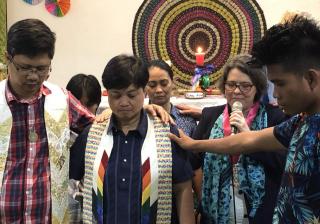Beloved Community Lab Philippines
By Ma Theresa "Tet" Gustilo Gallardo, Arman Pedro
In its funding round during the months of quarantine, the UU Funding Panel (UUFP) gave its full support to realize the Strategic Plan of the UU Church of the Philippines (UUCP). The UUCP plan envisioned church communities that are life-giving, learning, and loving in material and spiritual ways. The theme of the session was “A responsive and accountable Church”.
The UUFP funded innovations that support permaculture, which we shall begin very slowly: first, by maintaining the nursery of diverse native plants and trees that was launched with Rev. Susan Frederick-Gray in February this year when she and Rev. Alicia Forde of the UUA International Office visited the Philippines. The seedlings from this nursery will benefit all UU churches as they need them. Eventually, one of these congregational community gardens will develop into a free food garden or forest, most possibly in either Nataban Congregation or Nagbinlod Congregation.
The permaculture funding is part of a package called Community Innovations for Climate Action (CICA) that includes learning how to make, use, and build with mud bricks, recovering indigenous technology that uses free and abundant materials like loam soil, sand, and hay to create the same material of enduring structures like the pyramids. This program creates an abundance mindset and helps the poor communities address their needs for physical structures like an extra religious education space, a bathroom, a district office, etc. The third and last part of CICA is founding the UU Farmers Association. Farmers are critical on the frontlines, confronting food insecurity in the climate crisis, yet the average age of farmers in the Philippines is now 60. Farming practices are in danger and land use needs to be reclaimed through more interest in farming.
Permaculture cannot exist without Beloved Community. As the Executive Minister Rev. Tet Gallardo describes it: “It’s not just a culture that is life-giving, learning, and loving, it is also ‘leaderful’, where leaders emerge empowered.” A Beloved Community initiative was thus also funded by UUFP and it will incubate the new normal we need to stitch together. We need a new culture or mindset to shift to diverse cropping—which is the practice in permaculture—and away from the old normal of monocropping, or planting only one kind of dedicated crop for the market. Monocropping puts the vulnerable farmer at high risk from market forces, putting them at the mercy of capitalists who have little care for people or the planet. Beloved Community sessions will be conducted in all districts through the facilitation of the UU Ministerial Formation students, with modules designed in collaboration with them. This was the first time that the UUFP gave more than it was asked, 25% more in full support of the “Beloved Community Laboratory” as this is fondly called by some friends of UUCP.
Rev. Arman Pedro chimes in,
Our biggest goal here is to empower each and every congregation to eventually become self-sustaining and to be able to stand on their own feet, to have the courage to speak their truth, and to have the confidence in telling their story. Moreover, building compassionate leadership is crucial to the growth of our congregation. Everyone has their own specific needs and is facing their own battles by themselves. And they forget that they have a beloved community. We’ve been practicing beloved community for so long and it only need to be reinforced. We want to develop more leaders who are humble enough to reach out to the grassroots and telling them “we are here for you.” The real challenge is changing people’s mindset, to recognize their own strength and that everyone has the capability of changing their lives. They just need a catalyst to push them, motivate and encourage them to take the necessary first step forward. It may not be easy work for us considering our limitations, but we strongly believe that through collaboration we can slowly achieve our goal in building stronger, more resilient, and self-sustaining congregations.
The Universal Church of the Philippines, which would eventually become the UUCP, was founded in 1955 by 10 ministers including Rev. Toribio Quimada, who facilitated its membership with the UUA. The UU Church of the Philippines has 27 registered local congregations, but about 6 of them have been inactive for some time due to financial challenges. The UU Partner Church Council helps each congregation find partners for their sustainability, but so far only 7 have found either private sponsors or partner UU Churches in the UUA. It only takes about $60 a month to maintain a local church; all but one congregation are situated in farming communities. The remaining church is situated in the shanties of Manila, where houses built for four fit a family of 10. UU as a religion is already known among the middle and upper classes but is not yet as popular there. A small circle of professionals in Manila have been meeting since 2005, but their meetings have been erratic. That group is now being revived by Rev. Joseph Santos-Lyons and by Bob Guerrero, who founded it.
The UUCP has hopes of standardizing each church to be fitted with solar power, WiFi, a sound system, and a projector. Guitars and hymnals are already being supplied.
Last year, the UUCP hosted the first ever UU Asia Pacific Conference. And for the last months of the quarantine, they have been meeting at least once a month on Zoom.
